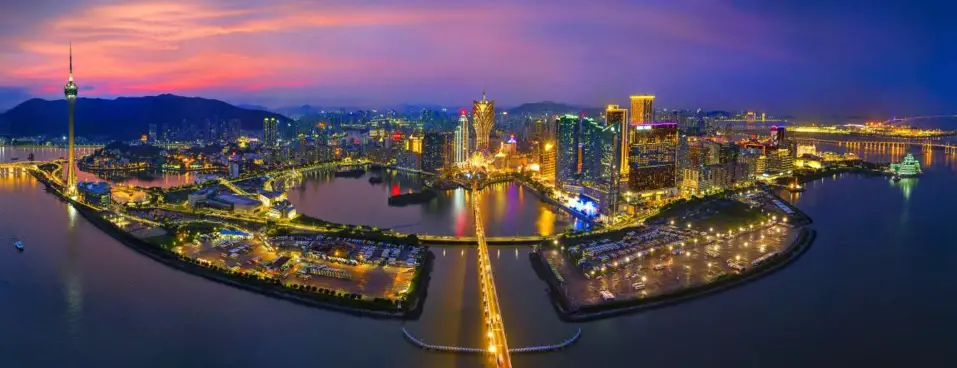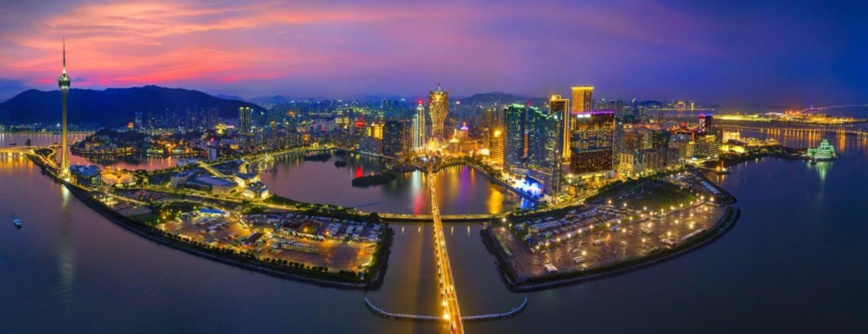By Wen Hongyan, Mao Lei, Wang Yao, Cheng Long, People’s Daily
Since its return to the motherland 20 years ago, Macao has written a glorious chapter of “one country, two systems”. Under the support of the central government and its inland counterparts, the city, which covers only 30 square kilometers, has forged ahead, creating the best development prospect in history and displaying the great advantages and vitality of the “one country, two systems” principle.
The State Council, China's cabinet, on Dec. 1 appointed principal officials of the fifth-term government of the Macao Special Administrative Region (SAR) and the prosecutor general of the Public Prosecutions Office, based on nominations by Ho Iat Seng, the fifth-term chief executive of the Macao SAR.
The principle "Macao people governing Macao" has been fully and faithfully implemented in Macao and the city has enjoyed a high degree of autonomy since the Chinese government resumed the exercise of sovereignty over Macao.
Two decades on, the Macao SAR has successfully held four chief executive elections, and five Legislative Assembly elections in accordance with the law, which genuinely reflects the policy of Macao people governing Macao with patriots playing the principal role in governance.
Macao has selected its own representatives to the National People’s Congress (NPC) every five years. Currently, there are 12 Macao deputies to the NPC, and 37 Macao members of the National Committee of the Chinese People’s Political Consultative Conference (CPPCC).
The majority of Macao compatriots, as members of the family of the motherland, have the democratic right to participate in the management of state affairs. As the owners of Macao, they bear the historical responsibility of managing and building the region.
Before Macao’s returning, for hundreds of years, Chinese participation in Macao's political affairs was almost zero, and it was not until 1997 that the first Chinese secured a post in the Macao government.
Fernando Chui Sai-on, the incumbent chief executive of the Macao SAR, who served in the Macao SAR since Macao’s return to the motherland, recalled that the young Macao SAR government started to operate having almost no complete governance experience, and the motivation for the officials to shoulder their responsibility was the fact that they were the masters of their own affairs.
Under the authorization and support of the central government, Macao's foreign exchanges continue to expand and its international influence keeps increasing, said Fu Ziying, director of the Liaison Office of the Central People's Government in the Macao SAR.
A total of 144 countries and regions have granted visa-free access or visa-on-arrival to the holders of Macao (SAR) passport. Besides, Macao has hosted the Ministerial Conference of the Forum on Trade and Economic Cooperation between China and Portuguese-speaking Countries (Macao) for five consecutive times, playing a unique role as a service platform for Sino-Portuguese business cooperation.
China’s Macao is calmly and confidently facing the world and integrating into the world, said Fu.
"The longer the return of Macao, the stronger sense of identification with the motherland we have," said Zhen Ruiquan, president of the Jiangmen Township Association of Macao, who added that the country’s help to Macao is remembered by the people.
Talking about the country's assistance and support to Macao, the Macao people always have a lot to say. For instance, the expansion of individual travel to Macao has brought great benefits to Macao and rapidly revitalized the region’s economy.
When the SARS virus swept the region, Hong Kong and Macao were prioritized in terms of drug supply. In 2017, Macao was attacked by Typhoon Hato, a strong wind unseen in decades. The PLA troops stationed in Macao fought for days and nights to clean up the flooded streets, and a large number of relief supplies and food from the mainland were continuously transported to Macao through Zhuhai.
When the motherland needs assistance, compatriots in Macao are always ready to lend a helping hand. After a severe earthquake hit Wenchuan of southwest China’s Sichuan province in 2008, the Macao SAR government established a coordination team to support post-quake reconstruction, and allocated 5 billion patacas ($624 million) for rehabilitation. Besides, the Macao Foundation allocated 500 million patacas to support a total of 106 projects.
Liu Yunchang, deputy director of the Public Security Police Force of Macao, said a flag-raising ceremony is held at 8:00 a.m. at the Golden Lotus Plaza every day. It is organized by the Public Security Forces of Macao, and participated by many citizens and tourists.
As Chinese President Xi Jinping said, "one country" is like the roots of a tree, and for a tree to grow tall and luxuriant, its roots must run deep and strong.
Comprehensive and accurate understanding and implementation of the "one country, two systems" policy, firmly grasp of the core essence of the "one country, two systems", and a clear-cut defense of national sovereignty, security, and development interests have become a precious experience of Macao's successful practice of "one country, two systems" principle.
The State Council, China's cabinet, on Dec. 1 appointed principal officials of the fifth-term government of the Macao Special Administrative Region (SAR) and the prosecutor general of the Public Prosecutions Office, based on nominations by Ho Iat Seng, the fifth-term chief executive of the Macao SAR.
The principle "Macao people governing Macao" has been fully and faithfully implemented in Macao and the city has enjoyed a high degree of autonomy since the Chinese government resumed the exercise of sovereignty over Macao.
Two decades on, the Macao SAR has successfully held four chief executive elections, and five Legislative Assembly elections in accordance with the law, which genuinely reflects the policy of Macao people governing Macao with patriots playing the principal role in governance.
Macao has selected its own representatives to the National People’s Congress (NPC) every five years. Currently, there are 12 Macao deputies to the NPC, and 37 Macao members of the National Committee of the Chinese People’s Political Consultative Conference (CPPCC).
The majority of Macao compatriots, as members of the family of the motherland, have the democratic right to participate in the management of state affairs. As the owners of Macao, they bear the historical responsibility of managing and building the region.
Before Macao’s returning, for hundreds of years, Chinese participation in Macao's political affairs was almost zero, and it was not until 1997 that the first Chinese secured a post in the Macao government.
Fernando Chui Sai-on, the incumbent chief executive of the Macao SAR, who served in the Macao SAR since Macao’s return to the motherland, recalled that the young Macao SAR government started to operate having almost no complete governance experience, and the motivation for the officials to shoulder their responsibility was the fact that they were the masters of their own affairs.
Under the authorization and support of the central government, Macao's foreign exchanges continue to expand and its international influence keeps increasing, said Fu Ziying, director of the Liaison Office of the Central People's Government in the Macao SAR.
A total of 144 countries and regions have granted visa-free access or visa-on-arrival to the holders of Macao (SAR) passport. Besides, Macao has hosted the Ministerial Conference of the Forum on Trade and Economic Cooperation between China and Portuguese-speaking Countries (Macao) for five consecutive times, playing a unique role as a service platform for Sino-Portuguese business cooperation.
China’s Macao is calmly and confidently facing the world and integrating into the world, said Fu.
"The longer the return of Macao, the stronger sense of identification with the motherland we have," said Zhen Ruiquan, president of the Jiangmen Township Association of Macao, who added that the country’s help to Macao is remembered by the people.
Talking about the country's assistance and support to Macao, the Macao people always have a lot to say. For instance, the expansion of individual travel to Macao has brought great benefits to Macao and rapidly revitalized the region’s economy.
When the SARS virus swept the region, Hong Kong and Macao were prioritized in terms of drug supply. In 2017, Macao was attacked by Typhoon Hato, a strong wind unseen in decades. The PLA troops stationed in Macao fought for days and nights to clean up the flooded streets, and a large number of relief supplies and food from the mainland were continuously transported to Macao through Zhuhai.
When the motherland needs assistance, compatriots in Macao are always ready to lend a helping hand. After a severe earthquake hit Wenchuan of southwest China’s Sichuan province in 2008, the Macao SAR government established a coordination team to support post-quake reconstruction, and allocated 5 billion patacas ($624 million) for rehabilitation. Besides, the Macao Foundation allocated 500 million patacas to support a total of 106 projects.
Liu Yunchang, deputy director of the Public Security Police Force of Macao, said a flag-raising ceremony is held at 8:00 a.m. at the Golden Lotus Plaza every day. It is organized by the Public Security Forces of Macao, and participated by many citizens and tourists.
As Chinese President Xi Jinping said, "one country" is like the roots of a tree, and for a tree to grow tall and luxuriant, its roots must run deep and strong.
Comprehensive and accurate understanding and implementation of the "one country, two systems" policy, firmly grasp of the core essence of the "one country, two systems", and a clear-cut defense of national sovereignty, security, and development interests have become a precious experience of Macao's successful practice of "one country, two systems" principle.
 Menu
Menu
 “One country, two systems” principle key to Macao’s prosperity
“One country, two systems” principle key to Macao’s prosperity

















